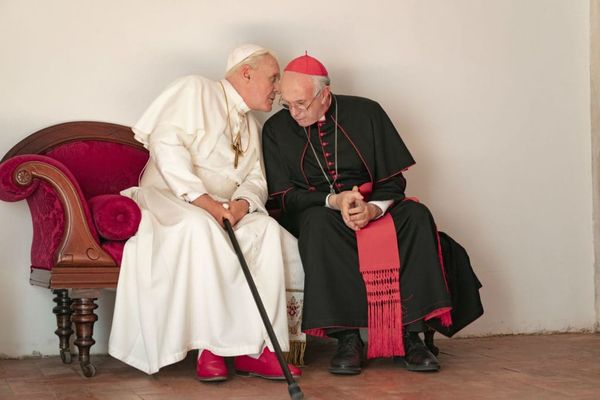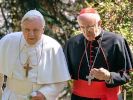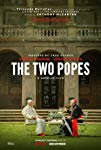Eye For Film >> Movies >> The Two Popes (2019) Film Review
The Two Popes
Reviewed by: Anne-Katrin Titze

A failed phone call from Vatican City to book a flight to Lampedusa forms a clever framing device which already mirrors the tone of what is to come. The production design by Mark Tildesley (Paul Thomas Anderson’s Phantom Thread) and art direction by Saverio Sammali (Ridley Scott’s All the Money In The World) are phenomenal. The ritual of the 115 Cardinals, voting for a new Pope, makes for impressive images, which are intercut with actual news coverage after the death of Pope John Paul II in 2005.
On this occasion in the film, Cardinal Jorge Bergoglio and Cardinal Joseph Ratzinger have an early, very funny exchange in the men’s room. Bergoglio whistles Dancing Queen and explains ABBA to the slightly baffled Ratzinger. The reference is tacky, yes, but the spectacle of the Papal election also does in some way resemble the Grand Prix Eurovision Song Contest, the picture seems to say.

"This is Europe; our churches are beautiful but empty," comments one of the other Cardinals. Sound design is fabulously crisp here - the blue pens, the needle and red thread, the lottery-like balls with the Cardinals' names on them all clink and finely rustle in suspense. Most may know the outcome, few remember the details of the first round. 47 for Ratzinger, 10 for Bergoglio, 9 for Martini. Black smoke rises, no one got the necessary 77 votes.
Shot by César Charlone (The Constant Gardener, Blindness, and Meirelles and Kátia Lund’s City Of God), with costumes by Beatriz De Benedetto (Walter Salles’s The Motorcycle Diaries) and Luca Canfora (who also worked with Carlo Poggioli on Paolo Sorrentino’s The New Pope and The Young Pope), The Two Popes has fun with effective visual shortcuts. The X-ray of church paraphernalia at the airport scanner heralds Bergoglio's trip to visit Ratzinger, now Pope Benedict, in order to ask permission to resign as the Archbishop of Buenos Aires.
From Rome, a car transports him to the Pope's summer residence. Bergoglio insists to sit in front, next to the driver, not in the back. Upon arrival, he immediately befriends the gardener, which results later in a gift of an oregano bouquet. Does Benedict really not know the difference between oregano and basil when he sees it and smells it on a helicopter? After all, he seems to go for walks by the all-organic gardens every day, because his fitness step-counter tells him to get moving.
The Two Popes is totally captivating when Pryce and Hopkins simply talk and react to each other. Beyond the formalities of their positions, the differing standpoints and backgrounds, these two Popes really, carefully try to understand the other as a human being, which is rare to see these days, in the cinema and beyond. The two men discuss questions of faith and compare what they like to watch on TV to relax (Kommissar Rex, an Austrian crime series starring a dog detective, and soccer, respectively).
What starts out as a verbal ping-pong match - "You make us look bad because we don't live simple enough." "Can you ever live simple enough?" - turns to a checklist of hot Vatican topics: Celibacy, homosexuality, women, and who can receive communion. That "mercy is the dynamite that blows down walls" they can agree on.
The camera comes closer and closer to both of them as they discuss 'compromise' and 'change' and the fact that angels only came into the picture since the 5th century, "like pigeons." In a wilder, darker segment of the garden, they seem to reach an impasse when talk turns to all the time they knew of priests abusing children.
After the solitary dinner, Pope Benedict, dressed in a pale grey woollen Bavarian vest with horn buttons, and his now companion continue to talk. In one shot, the arm of a chair looks like a snake crawling towards Benedict, visually linking the moment to a previous close-up of a serpent being stepped on in a painting. While Bergoglio's thoughts drift to 1956 Buenos Aires, Benedict plays the piano for him, including an unidentified Zarah Leander tune from his youth.
Although the Papal album was produced at Abbey Road Studios, he does not know Eleanor Rigby, and is "musically not infallible." This is the nearest we will ever get to Papal girl talk. Then they have some good wine. Benedict's loneliness is outstanding. God made him not feel alone, but "God never laughs."
The camerawork and the editing (by Fernando Stutz) go hand-in-hand with or comment on what words express. Cuts to the Golden Calf, the red shoes, the child-like eating of the pizza, or a candle with the smoke rising, all provide meaning with ease, casually and poignantly. There is a marvellous twist about the voice of God and naturally, from time to time, we become aware that what we are watching is fiction. Still, maybe because of that freedom of invention, the story works, as "the truth is vital, but without love it's unbearable."
A little tango, another conclave and a new Pope who states that "the carnival is over" when he steps out on the balcony all in white - none of it contradicts what we know. We see the two real Popes hugging and end with the World Cup in 2014 between Argentina and Germany, watched by two old pals.
Flashbacks in black and white are compelling (with Juan Minujín of Lucrecia Martel’s Zama as the young Bergoglio) when they interrupt the narrative, as if we entered the future Pope’s head. Simultaneously we listen and take in the information as it is being told to Benedict. We learn of an engagement, then the sign from God that made him choose priesthood, the terrible predicaments he faced in Argentina during the 1970s when he was the head of the Jesuits in his country and Uruguay.
Two of his priests were arrested and tortured, Father Jalics (Lisandro Fiks) and Father Yorio, played by Germán de Silva (unforgettable as the lead in Pablo Giorgelli’s Las Acacias and in Federico Veiroj’s The Moneychanger). The life-altering episodes from the past are so meticulously selected, that I was wishing we could get the same for the young Ratzinger.
Other films may briefly flicker into your mind - Wim Wenders' documentary portrait Pope Francis: A Man Of His Word, addressing climate change, for instance, or François Ozon's By The Grace Of God about the church abuse scandals, or Gianfranco Rosi's masterful Fire At Sea by the mere mention of Lampedusa.
On Tuesday, The Two Popes received five BAFTA nominations, including Best British Film, Best Adapted Screenplay for McCarten, Pryce and Hopkins for Actor and Supporting Actor respectively.
Reviewed on: 12 Jan 2020














